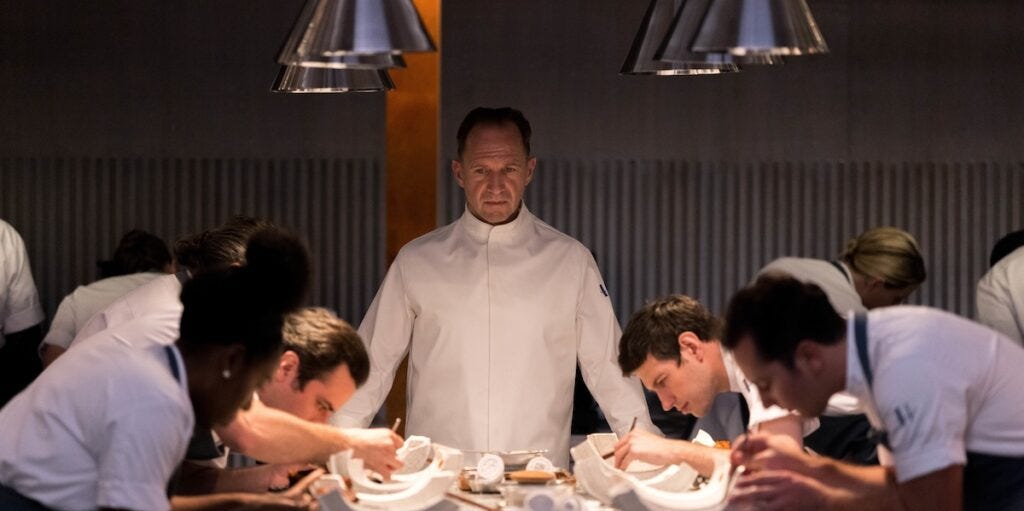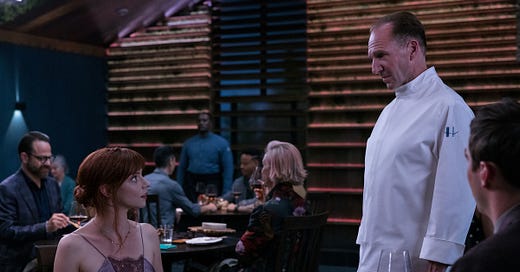The Menu is being sold as a riff on “The Most Dangerous Game,” Richard Connell’s 1924 short story about a wealthy lunatic who hunts a man, trailers highlighting a set piece near the middle of the film in which wealthy diners are let loose in a forest to be tracked down by Julian Slowik’s (Ralph Fiennes) assistant chefs. But this is a brief moment in the movie; The Menu has less in common with The Hunt or Surviving the Game than with this year’s Crimes of the Future or Tár. It’s a pitch-black meditation on the confluence of power, wealth, and taste.
Taste has two senses in The Menu. As the evening’s $1,250-per-diner meal begins, Slowik asks his patrons not to eat their food but to taste it, to savor it, to appreciate the colliding ingredients. But underneath foodie notions of the collision of fats and sweets and the secret joys of umami there’s a simpler question of taste, broadly speaking. Whether it can be bought. Whether it can be learned through admiration. Whether taste is the same as talent.
The diners are either wealthy or dining out on a corporate AmEx, as one might expect of a meal that costs as much as a pre-owned Omega Speedmaster per table. The audience surrogates are foodie Tyler (Nicholas Hoult) and his date, Margot (Anya Taylor-Joy), who is most decidedly not a foodie. They hop on a boat with a trio of finance bros whose boss bankrolls Slowik’s Hawthorn restaurant; a washed-up actor played by John Leguizamo and his assistant; restaurant critic Lillian Bloom (Janet McTeer) and her editor, Ted (Paul Adelstein); and Richard and Anne (Reed Birney and Judith Light), a wealthy couple who have been to Hawthorn nearly a dozen times and seem to recognize Margot.
There’s a sublime absurdity to the event from the beginning, simply the preciousness of it all: boarding a boat to travel to a private island where you tour the smokehouse that is dry-aging beef for 152 days before entering the dining room to eat minuscule gel-drops of some bizarre confection. Lillian and Ted trying to decide if what they’re eating—sorry, tasting—represents a “biome” or an “epicurean salon.” The movie star working on his sub-Bourdain “eating ’round the world” TV pitch to streaming services. The finance bro declaring “at least we have work!” when grappling with existential loneliness and draped in a hoodie that likely cost more than an off-the-rack suit. Tyler, wiping tears from his eyes, pronouncing that fine dining is “art on the edge of the abyss.”
The boorishness of the bros and the prissiness of the critic are flip sides of the same coin; neither really cares about the meal as anything other than a status symbol, even if the status the meal confers means different things to different groups. The critic can show off her power and her prose; the bros get to tell people they dined at the most elite spot in town; and foodie Tyler can die a happy man, knowing he’s summited the pinnacle of fine dining.

As with any satire, it is worth pondering for a moment what is being satirized and how effectively. Obviously there is the element of class here, one that highlights the inherent silliness anytime a basic activity like “eating” becomes a competitive status symbol; one could say The Menu gives the phrase “eat the rich” new meaning, har har. But class is a diversion.
It feels clear that The Menu is working as a broader metaphor for films and the film industry. The power of critics to make or break a restaurant or chef and the symbiotic relationship between critic and cook; Slowik’s atonement for a #MeToo transgression; the financier who kept Hawthorn afloat during COVID being condemned for demanding substitutions during his meals, a fate that anyone who saw their movie shifted from theatrical to streaming will understand and cheer. When it was revealed why Leguizamo’s movie star has been summoned to Hawthorn I let out an almost uncomfortably loud guffaw.
That’s the funniest moment in a darkly comic film, sold in part because few can do deadpan like Ralph Fiennes; between this, In Bruges, and Hail, Caesar!, he really is an underutilized comic talent. Anya Taylor-Joy is an icy delight, as always, and I’d be lying if I didn’t wince occasionally at McTeer’s stuffy critic. There’s something spot on about her efforts to intellectually complicate that which should be, simply, enjoyed.
After all, sometimes we just want a nice, juicy cheeseburger. No need to complicate our desires beyond that.





